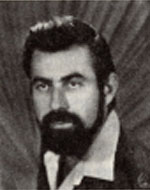Ben-Ari (Israel), Israel
Israel, son of Deborah and Aryeh, was born on June 22, 1947 in Lodz, Poland. In 1949 his family immigrated to Israel and settled in Netanya. He completed his studies at Bialik Elementary School and later went on to study in the evening, while in the day he worked as a diamond polisher. He helped his parents make a living and allowed them to move from their old home in the Ein HaTchelet neighborhood to their new apartment in Netanya. Israel has a lot of social activity in many different fields. He was an active member of the Hanoar Haoved movement in Netanya. He had a talent for folk dances and for his excellence as a dancer, he performed in the municipal dance troupe and later in the Israeli dance company “Carmon”. In the evenings he guided youth in high schools, in folk dancing. He was an outstanding athlete, especially in the fields of volleyball and soccer, and was a member of the football team of Maccabi Neve Shalom. Israel had a sensitive soul. He expressed his strong feelings of love and war poetry. He left behind a large collection of poems, which was discovered after his fall. He saw the sights he had seen and experiences he had experienced in landscapes and animal paintings. Israel was drafted into the IDF in early May 1964. After completing basic training, he was trained as a radio operator and sent to serve in the Northern Command, after which he was sent to an officer’s course and was appointed officer of the Southern Command. He became acquainted with the strength of the Armored Corps and asked to be transferred from the Armored Corps to the Armored Corps, where he was appointed commander of the Armach Company and during the War of Attrition he was commander of a stronghold on the banks of the Suez Canal. Who launched a heavy shelling out of the stronghold to build the barbed wire surrounding the dead In. He and his subordinates were praised for the overthrow of the Egyptian plane sample “Sukhoi” attacked the stronghold. In 1970 he toured Europe, the delegation of IDF officers. After his return, he underwent a course for armored corps officers and was appointed commander of a tank company. After that he was appointed deputy battalion commander and promoted to the rank of major. As a commander, the Israeli flag was branded “after.” He was the first to carry out any mission and never ordered his soldiers to do anything he had not done before. He is one of the commanders who heads the unit and leads their subordinates to carry out their missions. Israel served for six years in various positions in armored forces in Sinai. He was known for his love of the desert, to the point that he was nicknamed the Desert Wilderness. He became commander of the armored corps, who served more time than any other soldier in Sinai. In an interview with the Maariv newspaper after six years of service in Sinai, he explained the motives for his service for so long: “The responsibility placed on your shoulders is heavy and puts all your weight on you, So in armor, you know they need you there, that your people look at you and they’ll act like you. You have to be a model. “When the Yom Kippur War broke out, Israel was a member of the Command and Headquarters School, and quickly joined its battalion in Sinai and was commanded by a tank company, and its soldiers soon became attached to it. On October 15, 1973, he was at the head of the force moving into the compound of the Chinese Farm. On the way he helped rescue damaged tanks. He was in the first tank in the company, moving toward contact with better Egyptian force. On his way to the compound, a shell exploded near his tank, but Israel, loyal to the tradition of bare-turret, stood with his upper body outsideA tank hit him and killed him. He was awarded the Medal of Valor for his actions and fighting in the Chinese Farm. He was brought to eternal rest in the cemetery in Netanya. Survived by his parents and brother.
